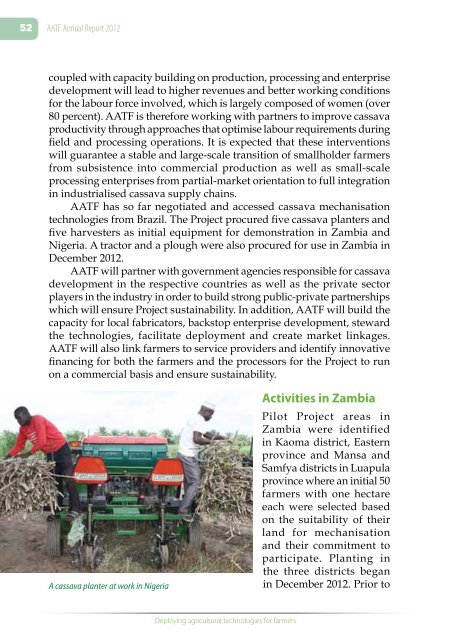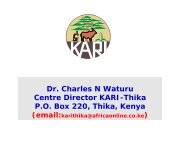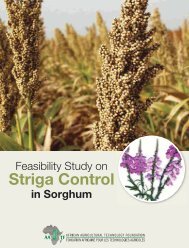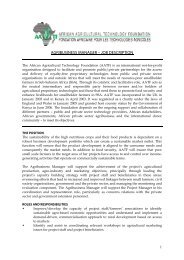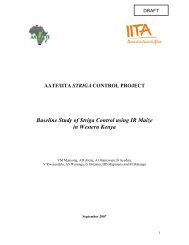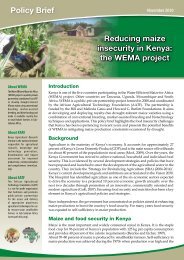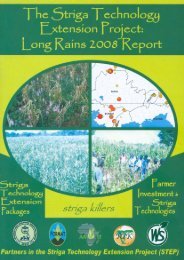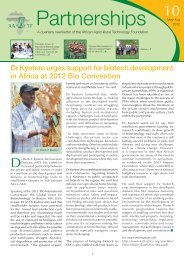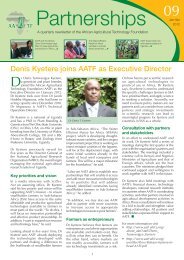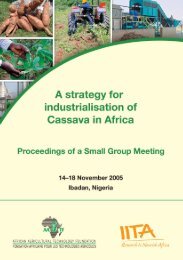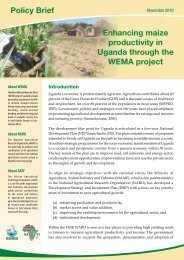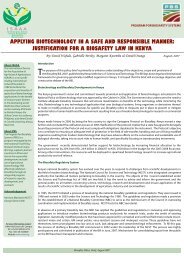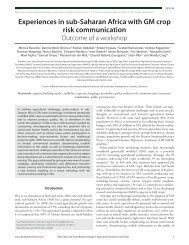Annual Report 2012 - African Agricultural Technology Foundation
Annual Report 2012 - African Agricultural Technology Foundation
Annual Report 2012 - African Agricultural Technology Foundation
You also want an ePaper? Increase the reach of your titles
YUMPU automatically turns print PDFs into web optimized ePapers that Google loves.
52 AATF <strong>Annual</strong> <strong>Report</strong> <strong>2012</strong><br />
coupled with capacity building on production, processing and enterprise<br />
development will lead to higher revenues and better working conditions<br />
for the labour force involved, which is largely composed of women (over<br />
80 percent). AATF is therefore working with partners to improve cassava<br />
productivity through approaches that optimise labour requirements during<br />
field and processing operations. It is expected that these interventions<br />
will guarantee a stable and large-scale transition of smallholder farmers<br />
from subsistence into commercial production as well as small-scale<br />
processing enterprises from partial-market orientation to full integration<br />
in industrialised cassava supply chains.<br />
AATF has so far negotiated and accessed cassava mechanisation<br />
technologies from Brazil. The Project procured five cassava planters and<br />
five harvesters as initial equipment for demonstration in Zambia and<br />
Nigeria. A tractor and a plough were also procured for use in Zambia in<br />
December <strong>2012</strong>.<br />
AATF will partner with government agencies responsible for cassava<br />
development in the respective countries as well as the private sector<br />
players in the industry in order to build strong public-private partnerships<br />
which will ensure Project sustainability. In addition, AATF will build the<br />
capacity for local fabricators, backstop enterprise development, steward<br />
the technologies, facilitate deployment and create market linkages.<br />
AATF will also link farmers to service providers and identify innovative<br />
financing for both the farmers and the processors for the Project to run<br />
on a commercial basis and ensure sustainability.<br />
A cassava planter at work in Nigeria<br />
Activities in Zambia<br />
Pilot Project areas in<br />
Zambia were identified<br />
in Kaoma district, Eastern<br />
province and Mansa and<br />
Samfya districts in Luapula<br />
province where an initial 50<br />
farmers with one hectare<br />
each were selected based<br />
on the suitability of their<br />
land for mechanisation<br />
and their commitment to<br />
participate. Planting in<br />
the three districts began<br />
in December <strong>2012</strong>. Prior to<br />
Deploying agricultural technologies for farmers


